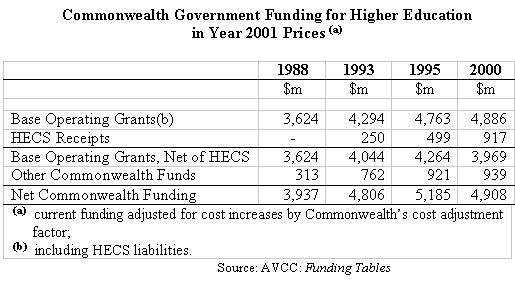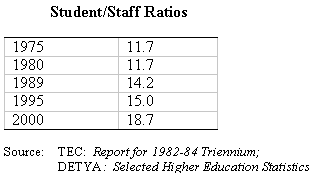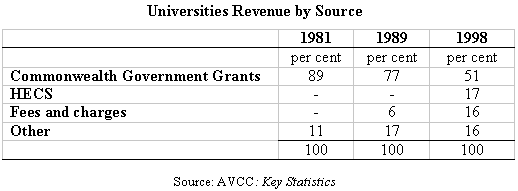|
A
"Dialogue"
|
Professor
Peter Karmel was Vice-Chancellor of the Australian National University from
1982-1987, and prior to that V-C of Flinders University. Until it was disbanded
in 1987 he chaired, the Australian Universities Commission and Commonwealth
Tertiary Education Commission. Since his retirement, Professor Karmel has
published articles, given lectures and made submissions to the Federal
Government as to the state of higher education in Australia and what remedial
measures ought to be taken. He was chair of the Australian Council for
Educational Research from 1979 to 1999.
In the "Dialogue" below, Professor Karmel's responses are
derived from his published material.+
The Funneled Web: Professor Karmel, something over five years ago (April 1997) you
made a submission to the "Review
of Higher Education Financing and Policy" in which you listed twelve
recommendations which included setting up, "A statutory body to advise the
Commonwealth on higher education matters, to administer Commonwealth higher
education programs and to act as a buffer between institutions and the
government." Since then have you altered your opinion.
Peter
Karmel: From 1959 to 1987 dealings between the Commonwealth Government and
the institutions of higher education were conducted through statutory
commissions. The commissions comprised a mix of senior experienced and
well-respected academics and leaders from business and the professions. They
were served by relatively small but well informed secretariats.
The Commission was inaugurated by Sir Robert Menzies as a
mechanism for ensuring university autonomy and freedom from political
interference - a buffer between the institutions and the Commonwealth
Government. Over the period 1959-87 Commissions advised the Commonwealth on
tertiary education and administered the Commonwealth’s tertiary education
programs.
The abolition of the Commonwealth Tertiary Education Commission [CTEC] in 1987 resulted in:
-
a loss of memory of the development of tertiary education in Australia;
-
a loss of bureaucratic expertise in institutional-government relations;
-
frequent personnel changes;
-
frequent policy changes;
-
direct Ministerial and bureaucratic involvement in detailed decision-making with resultant political lobbying;
-
delays in decision-making;
-
less transparent processes.
In my judgment, the existence of a statutory body as a buffer between the institutions and the Commonwealth Government is of the first importance.
TFW: In the intervening five years no such statutory body has been established, has your view as to its makeup changed since 1997?
PK: In 1997 I proposed that such a statutory body, say, a "Higher Education Commission", should:
be made up of two or three senior academics and a greater number of leaders from business and the professions (it certainly should not be a representative body);
be chaired by a person of vice-chancellorial status;
have a small, knowledgeable and stable secretariat who;
administer the programs with which it is directly involved (any other arrangement is a recipe for its increasing irrelevance);
make public its reports and recommendations to the Commonwealth.
TFW: And Now? What did you put into your submission to Dr. Nelson's Crossroads review "Discussion Paper"?
PK: The Discussion Paper does not raise the issue of government / institution relations. This is a serious omission. There is no discussion of the role of the independent statutory bodies that were involved in higher education in Australia for over 30 years and which continue to play a key role in other countries, such as the United Kingdom through the Higher Education Funding Councils. There is no reference to CTEC’s abolition in 1987.
My [current] submission states an independent statutory body standing between the universities and the government should be established. Its main responsibilities should be:
to advise the Commonwealth publicly on higher education matters, including the number of undergraduate and research training places to be supported by the Commonwealth and the rates of subsidy to be provided;
to report publicly, say triennially, on the state of higher education in Australia;
to administer Commonwealth programs relating to universities (other than
competitive research funding schemes).
It should encourage diversity among the institutions by supporting a plurality of priorities, and it should be chaired by a respected senior person with academic and management experience (of vice-chancellorial status or equivalent) and include eight members: two academics, two practitioners of the professions, two business persons and two members of the wider community. The members should be persons of high standing, who are well informed on how universities work and what they do. The membership should not include current vice-chancellors or senior university executives. It should certainly not be representative: the arrangements need to guard against capture by interest groups.
TFW: Obviously the five years haven't altered your view in any significant way. On the other hand the Government, if I may say so, doesn't seem to have taken much notice of your suggestion whether or not as you suggest it would be in the nations interest to do so.
PK: the existence of a buffer body between the institutions and the Commonwealth would reduce, if not eliminate, political pressures on the universities to conform to centrally determined policies [but it would also] protect the Commonwealth from self interested lobbying by individual institutions, state governments and regions.
TFW: Although you didn't include it as part of your submission, you did include your Joseph Fisher lecture at the University of Adelaide in your submission to the Senate Employment, Workplace Relations, Small Business and Education Committee and gave testimony before them just a year ago. As I recall you pointed out some "home truths."
PK: [I
pointed out that] Commonwealth outlays on higher education in real terms, net of HECS receipts,
are now 5 per cent lower than they were in 1995 despite an increase of 10
per cent in non-overseas student load and an increase of 25 per cent in the size
of the economy as measured by gross domestic product. Virtually the whole
expansion of domestic enrolments since the early 1990s, as reflected in base
operating grants, has been funded by a combination of students’ contributions
and increased teaching loads. Public funding of universities has been
significantly compressed.
The serious deficiency in funding that the universities have
faced in the last five or six years is mainly the result of two factors: the
introduction of enterprise bargaining into university industrial relations in
1993 in relation to which the Commonwealth no longer fully funds salary
increases, and the Commonwealth decision in 1996 to reduce its funding of base
operating grants by a total of 6 per cent over the years 1997-2000.
[The figures speak for themselves]

TFW: You've also pointed up, as have a number of others, the decline in staff / student ratios or increase in student / staff ratios if you want.
PK: [You know] during the 1970s and early 1980s considerable improvements were achieved in teacher / pupil ratios in schools. By and large, in spite of budgetary pressures, these improvements have been maintained through Commonwealth and State Government support for both government and non-government schools, with only a slight deterioration in government schools in some States. This is in striking contrast to the treatment accorded the Commonwealth funded higher education sector.

These declines were a response to pressures for improved efficiency and may have reflected an element of substitution of technology for face-to-face teaching. However by the year 2000, the institutions' reduced command over resources forced a further decline to 1 to 18.7 - a decline of over 20% in five years. As a result many classes are now far too large; staff / student contact has diminished; academic staff have inadequate time for preparation, study and their own scholarship and research; and morale is low. In the international market for top quality staff, salaries and working conditions are making the Australian universities increasingly unattractive.
TFW: Could we return for a moment to the question of funding for universities, over the past twenty years the relative contribution by the Commonwealth government has declined and declined dramatically, where have the additional funds come from.
PK: The universities have been active, and in many cases very successful, in seeking alternative sources of revenue.

However major elements of the revenue from new sources are dedicated to
particular activities (especially research and consultancies), and fees from
overseas students are largely absorbed by teaching those students. The fact is
that the teaching of Australian undergraduates and the training of Australian
research students has been and remains virtually 100 per cent dependent on the
Commonwealth Government. It must be remembered that the Commonwealth determines
the level of HECS payments for undergraduates just as it determines the level of
its grants; thus, the universities remain almost 70 per cent dependent on the
Commonwealth with its highly centralised mode of dealing with the institutions.
Moreover the thrust towards the commercialization of university activities
(especially research), apart from carrying high risks, raises the questions of
whether commercialization is not a distraction from the universities' core
business of teaching and research... [O]bjective analysis is needed.
TFW: Bob Bessant in the recent volume "The Subversion of Australian
Universities" claims that in almost all Australian universities professorial or
academic boards have been replaced by a top-down managerial system and concludes
that criticisms that traditional universities were elitist, hierarchical,
unresponsive and individualistic are either myths or justifications for economic
rationalism.
Two of the points that came from the questioning during the
Senate committee's recent hearings on higher education and has been pushed by
both major political parties are the matters of accountability and quality
assessment. I recall Labor's Senator Carr saying to you, "Your views insofar as
they are arguing that the Commonwealth government should take less of a role in
the management of what is now in excess of $3 billion are, might I suggest,
unusual. What do you say to the question of the need for public
accountability for the expenditure of public funds?
How do you respond to that?"
PK: I think it is important that the university publish proper accounts, that they are properly audited and that they are run by councils which have representative people on them who are both representative of the parliament and of various sectors in the community. I think that in the case of undergraduates the quality of the work of the universities will be judged to some extent by the students themselves and by employers. I do not think there is a problem in ensuring that universities are responsive if the actual government structures are appropriate and I certainly think accountability in the sense of remaining financially viable and not getting involved with any kinds of rorts and so on is of great importance.
[As to the matter of quality assurance, in] March 2000 the Ministerial Council on Education, Employment, Training and Youth Affairs (MCEETYA) endorsed the establishment of the Australian Universities Quality Agency (AUQA) as an independent body to conduct quality audits of higher education institutions on a five yearly basis. The emphasis is on the quality assurance processes employed by institutions and the audits will be conducted on a whole-of-institution basis. [But] discussions of quality in universities seldom specify quality characteristics in ways capable of precise definition or measurement. The benefits that a university education may be expected to confer on graduates (and which reflect the quality of that education) accrue not on graduation but over a lifetime and therefore are difficult to assess at any given time.
There is a risk that quality assurance procedures will be set up in institutions which will absorb considerable resources and be little more than rituals pursued to conform with the requirements of bodies external to them. A "whole-of-institution" approach seems likely to reinforce this risk, since the heterogeneity of a university's activities makes variability of quality within the institution probable.
The existence of quality assurance mechanism is relatively unimportant if quality outcomes are in fact being achieved; if they are not being achieved the existence of quality assurance rituals is no guarantee of quality improvement. In all considerations of quality in universities the fundamental role played by academic staff needs to be emphasized: the surest route to high quality outcomes is high quality staff. The alternative approach to quality assurance reviews of whole institutions is peer review on a course or field of study basis.
TFW: When Professor Anderson gave his valedictory
address as retiring president to the Australian Academy of Science he
"
Would you say that's fair comment?
PK: [Let me put it this way]. The Commonwealth Government in
allocating funds has made a good deal of use of formulae. The distribution of
operating grants has been based on a formula since the relative funding model
was established in 1990. As a consequence of the White Paper on research funding
(Kemp, 1999), the allocation of funding for research training, as well as the
allocation of the research quantum (now institutional grants) and the research
infra-structure block grants, is formula based. Many universities have
themselves adopted the formulae (sometimes in a modified form) for internal
allocation purposes - a practice which places internal allocation procedures in
a straitjacket and greatly reduces managerial discretion in funding.
As far as allocation among institutions is concerned, the use of publicly known
formulae almost always produces unintended, but perfectly predictable,
consequences. Universities feel they have little choice but to play the formula,
incentives are affected and undesirable consequences emerge (e.g. researchers
may be encouraged to produce numbers of small, quick and superficial
publications rather than a major piece of work, universities may engage in
wasteful competition and misleading advertising to attract students, diversity
among institutions may be reduced as they attempt to profit from a common
formula). On the whole publicly known and automatically applied formula funding
ought to be avoided.
TFW: It sounds to me that there isn't significant disagreement between
you and Brain Anderson.
In your Joseph Fisher Lecture you take some nine pages to
discuss what you see as needed reforms to the higher education. Interestingly,
although Dr. Nelson's first Discussion Paper lists your submission to the Senate
committee in the References section nowhere is it referred to it in the body of
the document. Here you've already alluded to some of the reforms you see as
being needed. While we don't have space to go into extensive detail, how
would you sum up your overall opinion.
PK: The matters that I have just discussed illustrate the need for major reforms in the arrangements for higher education in this country as well as for additional public resources. Without these reforms and without additional resources, Australia's higher education system is likely to regress towards a uniform mediocrity. [I set out my proposals] in some detail in my paper "Reforming Higher Education" published as an Occasional Paper by the Academy of Social Sciences in Australia* and in my response to the recent Ministerial Discussion Paper Higher Education at the Crossroads.
TFW: Thank you, Professor Karmel; perhaps after all these years the
Federal Government might take heed of your advice.
___________________________________________________________________________________
+Professor Karmel's "responses"
have been reproduced with his consent.